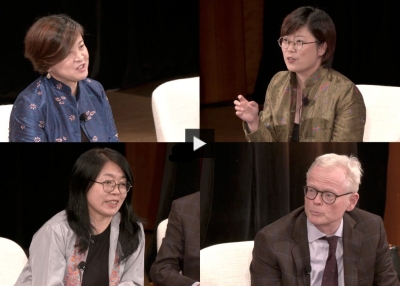China Reporting in Exile: A Conversation With Chinese Journalists Leading From Abroad
New York, Oct. 30 — In recent years, many of China’s most distinguished journalists have found themselves living and working outside of China. What insights can their work bring? What does their reporting miss? What role can independent Chinese language media outlets abroad play in shaping public opinion within China? To explore these questions, ChinaFile’s Susan Jakes and the Council on Foreign Relations’ Ian Johnson hosted a discussion with three women reporting on China: editor, reporter, and digital media entrepreneur Annie Jieping Zhang; The New York Times’ Li Yuan, who is also the host of the popular Bu Mingbai Podcast; and investigative journalist and essayist Jiang Xue.
Li Yuan discussed the genesis behind Bu Mingbai, which aims to provide uncensored interviews with experts and ordinary Chinese about what is going on inside China: “I started [the podcast] in the middle of the Shanghai lockdown. It was a very traumatic period not only just for Shanghai people who were locked down for many weeks, but for all Chinese people.” While she was writing for The New York Times, Yuan wanted a platform to speak directly to a Chinese audience. “I was surprised how many Chinese liked [the podcast],” she said. “When the White Paper Protests started, I tweeted on Twitter and said I would like to talk to people who participated in the protest in Shanghai last night. I was overwhelmed with replies. So many people wanted to talk to me and trusted me.”
Bu Mingbai is often distributed in We Chat discussion groups in ways that evade Chinese Communist Party (CCP) censorship. According to Ian Johnson, when the podcast is sent to a chat “the rule is kind of that you can’t make any commentary, you can’t say anything inside the group, you can just post [the recording] and have people listen to it. You’re not going to attract any attention by saying nothing that censors can get a hold of.”
Annie Jieping Zhang likewise believes in the importance of building communities — like the WeChat groups that share Yuan’s Bu Mingbai podcast — who trust each other enough to share information from reporters outside of China. “We need to try and find a system where we can put all these diversified small groups together without putting them together in the same platform,” said Zhang.
“The impact is pretty big,” said Johnson about the work of journalists who are reporting from outside of China. “Jiang Xue also wrote a piece about the youth of China that went viral, and all through China were reading it and recirculating it — you know the usual cat and mouse game — but you can tell that these pieces do have reach even when written abroad, in exile.”
Susan Jakes noted that many Chinese journalists are women and asked the panel why they thought this was the case. Johnson shared that both of the journalists who he focuses on in his recent book Sparks: China’s Underground Historians and Their Battle for the Future — one of whom is Jiang Xue — are women. “I think part of it — this is just one hypothesis — is that women are obviously a part of Chinese society but held back, so they are kind of outsiders and don’t really benefit. They are not really part of the power structure: there’s no women in the standing committee, the Politburo, and I don’t think there’s hardly any women in even the Central Committee of about 100 people...This gives them a more critical view towards society."
Jiang agrees. She believes that the difficulties women experience in patriarchal societies can feed into a desire to challenge existing power structures through reporting. This became particularly apparent during the recent White Paper Protests and China’s response to the #MeToo movement. Jiang noted that female empathy towards marginalized members of society is stronger, and maybe that is why women are at the forefront of these kinds of movements. She also believes that women have a deeper sense of emotions, tragedies, and traumas, which allows them to connect better with audiences when writing about complicated shared memories like the Covid lockdowns.
“I just want the world to hear the Chinese people’s voices,” said Yuan, reflecting once again on the importance of reporting from outside of China. “For the Chinese audience, when they scale the great firewall, coming [outside of] the wall, I don’t want them to see a desert, you know? I want to plant a tree, and I think that many more people can be involved in this. Eventually we can provide all kinds of information, all kinds of facts and truths, so that when people want to get information, they can get good quality accurate information that can inform them on what is really happening in China.”
